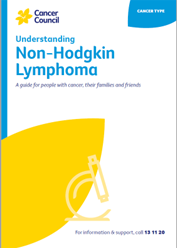- Home
- Non-Hodgkin lymphoma
- Symptoms
Symptoms of non-Hodgkin lymphoma
Non-Hodgkin lymphoma can cause different symptoms depending on where it is found in the body.
Most common symptom – a painless swelling in the neck, under the arm or in the groin, caused by enlarged lymph nodes.
B symptoms – having a fever with no obvious cause; lots of sweating, especially at night; and losing weight without trying.
Other symptoms – may include feeling very tired, weak, drained and worn-out (known as fatigue) or, in rare cases, having itchy skin. Sometimes non-Hodgkin lymphoma starts in lymph nodes in deeper parts of the body, such as the:
- stomach or spleen (causing bloating or back pain)
- bowels or abdomen (causing low appetite, stomach upsets, changes in bowel movements or belly pain)
- chest (causing coughing and difficulty swallowing or breathing)
- brain and spinal cord (causing headaches or double vision).
These symptoms are common to many conditions, such as the flu or a virus. If you have any symptoms without an obvious cause, make an appointment to see your general practitioner (GP).
I’d noticed a lump in my neck but didn’t think much of it. When I started sweating so much at night that the sheets were drenched, I went to the doctor. After a biopsy I was told I had follicular lymphoma. I had no idea what that was.
Helen
→ READ MORE: Non-Hodgkin lymphoma diagnosis
Podcast for people affected by cancer
Listen now
More resources
Dr Puja Bhattacharyya, Haematology Staff Specialist, Western Sydney Local Health District, Blacktown Hospital; A/Prof Christina Brown, Haematologist, Royal Prince Alfred Hospital and The University of Sydney; Dr Susan Carroll, Senior Staff Specialist, Radiation Oncology, Royal North Shore Hospital and The University of Sydney; Jo Cryer, Clinical Nurse Consultant, Haematology, St George Hospital; Marie Marr, Consumer; Katelin Mayer, Clinical Nurse Consultant, Cancer Outreach Team, Nelune Comprehensive Cancer Centre, Sydney; Vanessa Saunders, 13 11 20 Consultant, Cancer Council NSW; Elise Toyer, Haematology Clinical Nurse Consultant, Blacktown Hospital.
View the Cancer Council NSW editorial policy.
View all publications or call 13 11 20 for free printed copies.



